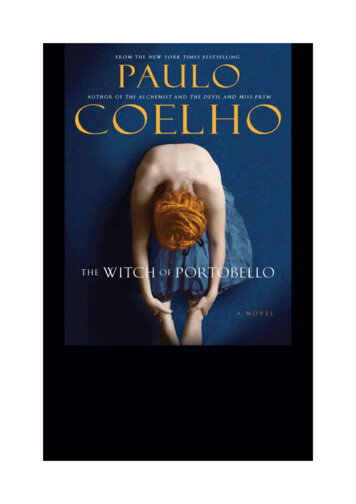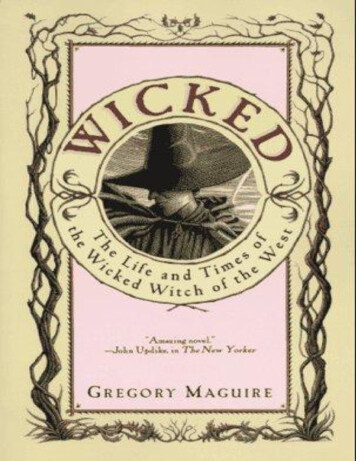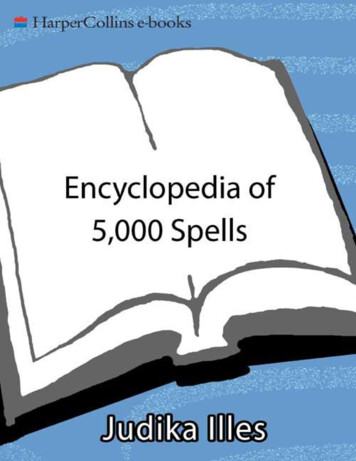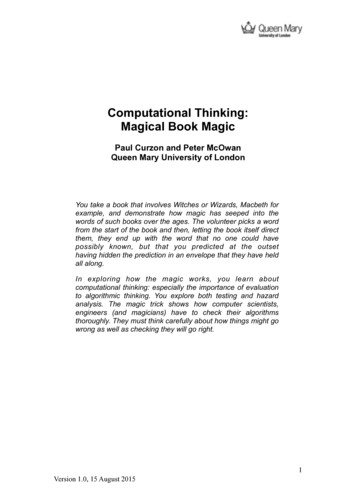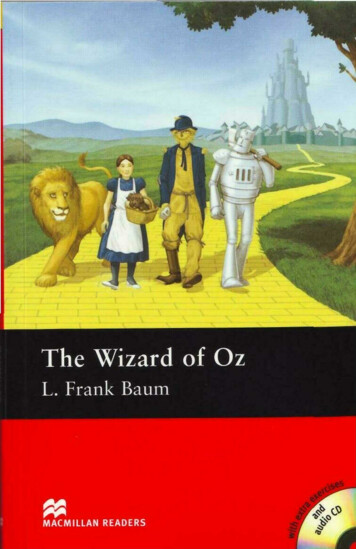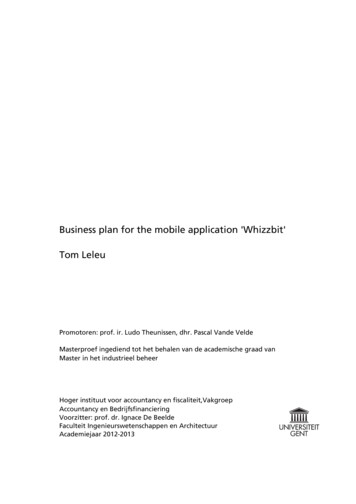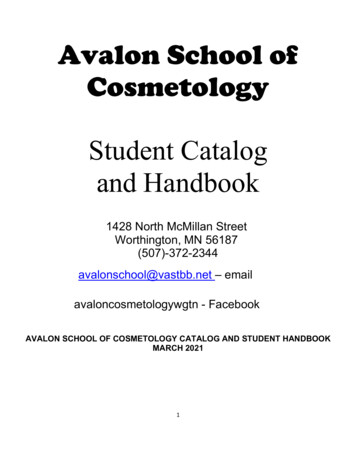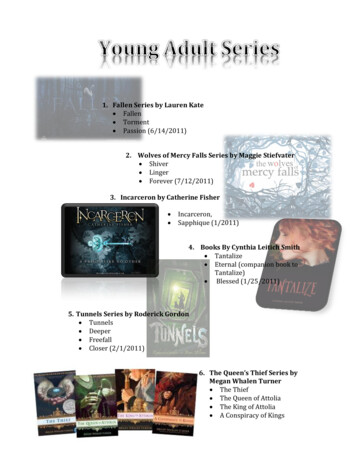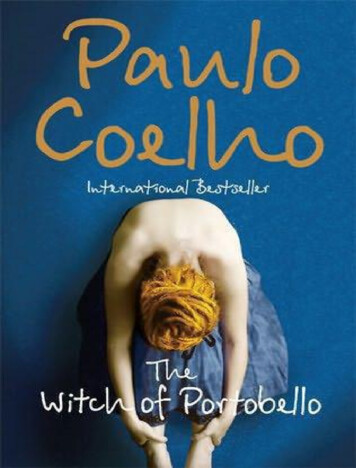
Transcription
The Witch of Portbello
The Witch of PortbelloThe Witch of Portbello Coelho, PauloNo man, when he hath lighted a candle,putteth it in a secret place, neither under a bushel,but on a candlestick, that they which come in maysee the light.Luke 11: 33Before these statements left my desk andfollowed the fate I eventually chose for them, Iconsidered using them as the basis for atraditional, painstakingly researched biography,recounting a true story. And so I read variousbiographies, thinking this would help me, only torealise that the biographer's view of his subjectinevitably influences the results of his research.Since it wasn't my intention to impose my ownopinions on the reader, but to set down the storyof the 'Witch of Portobello' as seen by its mainprotagonists, I soon abandoned the idea of writinga straight biography and decided that the bestapproach would be simply to transcribe whatpeople had told me.Heron Ryan, 44, journalistNo one lights a lamp in order to hide it behindthe door: the purpose of light is to create morelight, to open people's eyes, to reveal the marvels
around.No one sacrifices the most important thingshe possesses: love.No one places her dreams in the hands ofthose who might destroy them.No one, that is, but Athena.A long time after Athena's death, her formerteacher asked me to go with her to the town ofPrestonpans in Scotland. There, taking advantageof certain ancient feudal powers which were dueto be abolished the following month, the town hadgranted official pardons to 81 people and theircats who were executed in the sixteenth andseventeenth centuries for practising witchcraft.According to the official spokeswoman forthe Barons Courts of Prestoungrange &Dolphinstoun: 'Most of those persons condemnedwere convicted on the basis of spectral evidencethat is to say, prosecuting witnesses declared thatthey felt the presence of evil spirits or heard spiritvoices.'There's no point now in going into all theexcesses committed by the Inquisition, with itstorture chambers and its bonfires lit by hatred andvengeance; however, on our way to Prestonpans,Edda said several times that there was somethingabout that gesture which she found unacceptable:the town and the 14th Baron of Prestoungrange &Dolphinstoun were 'granting pardons' to people
who had been brutally executed.'Here we are in the twenty-first century, andyet the descendants of the real criminals, thosewho killed the innocent victims, still feel they havethe right to grant pardons. Do you know what Imean, Heron?'I did. A new witch-hunt is starting to gainground. This time the weapon isn't the red-hotiron, but irony and repression. Anyone whohappens to discover a gift and dares to speak oftheir abilities is usually regarded with distrust.Generally speaking, their husband, wife, father orchild, or whoever, instead of feeling proud, forbidsall mention of the matter, fearful of exposing theirfamily to ridicule.Before I met Athena, I thought all such giftswere a dishonest way of exploiting people'sdespair. My trip to Transylvania to make adocumentary on vampires was also a way ofproving how easily people are deceived. Certainsuperstitions, however absurd they may seem,remain in the human imagination and are oftenused by unscrupulous people. When I visitedDracula's castle, which has been reconstructedmerely to give tourists the feeling that they're in aspecial place, I was approached by a governmentofficial, who implied that I would receive a'significant' (to use his word) gift when the film wasshown on the BBC. In the mind of that official, I
was helping to propagate the myth, and thusdeserved a generous reward. One of the guidessaid that the number of visitors increased eachyear, and that any mention of the place wouldprove positive, even a programme saying that thecastle was a fake, that Vlad Dracula was ahistorical figure who had nothing to do with themyth, and that it was all merely a product of thewild imaginings of one Irishman ( Editor's note:Bram Stoker ), who had never even visited theregion.I knew then that, however rigorous I was withthe facts, I was unwittingly collaborating with thelie; even if the idea behind my script was todemythologise the place, people would believewhat they wanted to believe; the guide was right, Iwould simply be helping to generate morepublicity. I immediately abandoned the project,even though I'd already spent quite a lot of moneyon the trip and on my research.And yet my journey to Transylvania was tohave a huge impact on my life, for I met Athenathere when she was trying to track down hermother. Destiny mysterious, implacable Destinybrought us face to face in the insignificant foyer ofa still more insignificant hotel. I was witness to herfirst conversation with Deidre or Edda, as shelikes to be called. I watched, as if I were aspectator of my own life, as my heart struggled
vainly not to allow itself to be seduced by awoman who didn't belong to my world. Iapplauded when reason lost the battle, and all Icould do was surrender and accept that I was inlove.That love led me to see things I'd neverimagined could exist rituals, materialisations,trances. Believing that I was blinded by love, Idoubted everything, but doubt, far from paralysingme, pushed me in the direction of oceans whosevery existence I couldn't admit. It was this sameenergy which, in difficult times, helped me toconfront the cynicism of journalist colleagues andto write about Athena and her work. And sincethat love remains alive, the energy remains, eventhough Athena is dead, even though all I want nowis to forget what I saw and learned. I could onlynavigate that world while hand in hand withAthena.These were her gardens, her rivers, hermountains. Now that she's gone, I need everythingto return as quickly as possible to how it used tobe. I'm going to concentrate more on trafficproblems, Britain's foreign policy, on how weadminister taxes. I want to go back to thinking thatthe world of magic is merely a clever trick, thatpeople are superstitious, that anything sciencecannot explain has no right to exist.When the meetings in Portobello started to
get out of control, we had endless argumentsabout how she was behaving, although I'm gladnow that she didn't listen to me. If there is anypossible consolation in the tragedy of losingsomeone we love very much, it's the necessaryhope that perhaps it was for the best.I wake and fall asleep with that certainty; it'sbest that Athena left when she did rather thandescend into the infernos of this world. She wouldnever have regained her peace of mind after theevents that earned her the nickname 'the witch ofPortobello'. The rest of her life would have been abitter clash between her personal dreams andcollective reality. Knowing her as I did, she wouldhave battled on to the end, wasting her energyand her joy on trying to prove something that noone, absolutely no one, was prepared to believe.Who knows, perhaps she sought death theway a shipwreck victim seeks an island. She musthave stood late at night in many a Tube station,waiting for muggers who never came. She musthave walked through the most dangerous parts ofLondon in search of a murderer who neverappeared, or perhaps tried to provoke the angerof the physically strong, who refused to get angry.Until, finally, she managed to get herselfbrutally murdered. But, then, how many of us willbe saved the pain of seeing the most importantthings in our lives disappearing from one moment
to the next? I don't just mean people, but our ideasand dreams too: we might survive a day, a week,a few years, but we're all condemned to lose. Ourbody remains alive, yet, sooner or later, our soulwill receive the mortal blow. The perfect crime forwe don't know who murdered our joy, what theirmotives were or where the guilty parties are to befound.Are they aware of what they've done, thosenameless guilty parties? I doubt it, because they,too the depressed, the arrogant, the impotent andthe powerful are the victims of the reality theycreated.They don't understand and would beincapable of understanding Athena's world. Yes,that's the best way to think of it Athena's world. I'mfinally coming to accept that I was only atemporary inhabitant, there as a favour, likesomeone who finds themselves in a beautifulmansion, eating exquisite food, aware that this isonly a party, that the mansion belongs to someoneelse, that the food was bought by someone else,and that the time will come when the lights will goout, the owners will go to bed, the servants willreturn to their quarters, the door will close, andwe'll be out in the street again, waiting for a taxi ora bus to restore us to the mediocrity of oureveryday lives.I'm going back, or, rather, part of me is going
back to that world where only what we can see,touch and explain makes sense. I want to getback to the world of speeding tickets, peoplearguing with bank cashiers, eternal complaintsabout the weather, to horror films and Formula 1racing. This is the universe I'll have to live with forthe rest of my days. I'll get married, have children,and the past will become a distant memory, whichwill, in the end, make me ask myself: How could Ihave been so blind? How could I have been soingenuous?I also know that, at night, another part of mewill remain wandering in space, in contact withthings as real as the pack of cigarettes and theglass of gin before me now. My soul will dancewith Athena's soul; I'll be with her while I sleep; I'llwake up sweating and go into the kitchen for aglass of water. I'll understand that in order tocombat ghosts you must use weapons that formno part of reality. Then, following the advice of mygrandmother, I'll place an open pair of scissors onmy bedside table to snip off the end of the dream.The next day, I'll look at the scissors with atouch of regret, but I must adapt to living in theworld again or risk going mad.Andrea McCain, 32, actress'No one can manipulate anyone else. In anyrelationship, both parties know what they're doing,even if one of them complains later on that they
were used.'That's what Athena used to say, but sheherself behaved quite differently, because sheused and manipulated me with no considerationfor my feelings. And given that we're talking aboutmagic here, this makes the accusation an evenmore serious one; after all, she was my teacher,charged with passing on the sacred mysteries,with awakening the unknown force we all possess.When we venture into that unfamiliar sea, we trustblindly in those who guide us, believing that theyknow more than we do.Well, I can guarantee that they don't. NotAthena, not Edda, nor any of the people I came toknow through them. She told me she was learningthrough teaching, and although, at first, I refused tobelieve this, later, I came to think that perhaps itwas true. I realised it was one of her many ways ofgetting us to drop our guard and surrender to hercharm.People who are on a spiritual quest don'tthink, they simply want results. They want to feelpowerful and superior to the anonymous masses.They want to be special. Athena played with otherpeople's feelings in a quite terrifying way.I understand that she once felt a profoundadmiration for St Therese of Lisieux. I have nointerest in the Catholic faith, but, from what I'veheard, Therese experienced a kind of mystical
and physical union with God. Athena mentionedonce that she would like to share a similar fate.Well, in that case, she should have joined aconvent and devoted her life to prayer or to theservice of the poor. That would have been muchmore useful to the world and far less dangerousthan using music and rituals to induce in people akind of intoxicated state that brought them intocontact with both the best and the worst ofthemselves.I sought her out when I was looking for somemeaning to my life, although I didn't say as muchat our first meeting. I should have realised fromthe start that Athena wasn't very interested in that;she wanted to live, dance, make love, travel, togather people around her in order to demonstratehow wise she was, to show off her gifts, toprovoke the neighbours, to make the most of allthat is profane in us although she always tried togive a spiritual gloss to that search.Whenever we met, whether it was to performsome magical ceremony or to meet for a drink, Iwas conscious of her power. It was so strong Icould almost touch it. Initially, I was fascinated andwanted to be like her. But one day, in a bar, shestarted talking about the 'Third Rite', which has todo with sexuality. She did this in the presence ofmy boyfriend. Her excuse was that she wasteaching me something. Her real objective, in my
opinion, was to seduce the man I loved.And, of course, she succeeded.It isn't good to speak ill of people who havepassed from this life onto the astral plane.However, Athena won't have to account to me, butto all those forces which she turned to her ownbenefit, rather than channelling them for the goodof humanity and for her own spiritualenlightenment.The worst thing is that if it hadn't been for hercompulsive exhibitionism, everything we begantogether could have worked out really well. Hadshe behaved more discreetly, we would now befulfilling the mission with which we were entrusted.But she couldn't control herself; she thought shewas the mistress of the truth, capable ofovercoming all barriers merely by using herpowers of seduction.And the result? I was left alone. And I can'tleave the work half-finished I'll have to continue tothe end, even though sometimes I feel very weakand often dispirited.I'm not surprised that her life ended as it did:she was always flirting with danger. They say thatextroverts are unhappier than introverts, and haveto compensate for this by constantly proving tothemselves how happy and contented and at easewith life they are. In her case, at least, this isabsolutely true.
Athena was conscious of her own charisma,and she made all those who loved her suffer.Including me.Deidre O'Neill, 37, doctor, known as EddaIf a man we don't know phones us up one dayand talks a little, makes no suggestions, saysnothing special, but nevertheless pays us the kindof attention we rarely receive, we're quite capableof going to bed with him that same night, feelingrelatively in love. That's what we women are like,and there's nothing wrong with that it's the natureof the female to open herself to love easily.It was this same love that opened me up tomy first encounter with the Mother when I wasnineteen. Athena was the same age the first timeshe went into a trance while dancing. But that's theonly thing we had in common the age of ourinitiation.In every other aspect, we were totally andprofoundly different, especially in the way we dealtwith other people. As her teacher, I always did mybest to help her in her inner search. As her friendalthough I'm not sure my feelings of friendshipwere reciprocated I tried to alert her to the factthat the world wasn't ready for the kind oftransformations she wanted to provoke. Iremember spending a few sleepless nightsbefore deciding to allow her to act with totalfreedom and follow the demands of her heart.
Her greatest problem was that she was awoman of the twenty-second century living in thetwenty-first, and making no secret of the facteither. Did she pay a price? She certainly did. Butshe would have paid a still higher price if she hadrepressed her true exuberant self. She would havebeen bitter and frustrated, always concernedabout 'what other people might think', alwayssaying 'I'll just sort these things out, then I'll devotemyself to my dream', always complaining 'that theconditions are never quite right'.Everyone's looking for the perfect teacher,but although their teachings might be divine,teachers are all too human, and that's somethingpeople find hard to accept. Don't confuse theteacher with the lesson, the ritual with the ecstasy,the transmitter of the symbol with the symbol itself.The Tradition is linked to our encounter with theforces of life and not with the people who bringthis about. But we are weak: we ask the Mother tosend us guides, and all she sends are signs to theroad we need to follow.Pity those who seek for shepherds, insteadof longing for freedom! An encounter with thesuperior energy is open to anyone, but remainsfar from those who shift responsibility onto others.Our time on this Earth is sacred, and we shouldcelebrate every moment.The importance of this has been completely
forgotten: even religious holidays have beentransformed into opportunities to go to the beachor the park or skiing. There are no more rituals.Ordinary actions can no longer be transformedinto manifestations of the sacred. We cook andcomplain that it's a waste of time, when we shouldbe pouring our love into making that food. Wework and believe it's a divine curse, when weshould be using our skills to bring pleasure and tospread the energy of the Mother.Athena brought to the surface the immenselyrich world we all carry in our souls, withoutrealising that people aren't yet ready to accepttheir own powers.We women, when we're searching for ameaning to our lives or for the path of knowledge,always identify with one of four classic archetypes.The Virgin (and I'm not speaking here of asexual virgin) is the one whose search springsfrom her complete independence, and everythingshe learns is the fruit of her ability to facechallenges alone.The Martyr finds her way to self-knowledgethrough pain, surrender and suffering.The Saint finds her true reason for living inunconditional love and in her ability to give withoutasking anything in return.Finally, the Witch justifies her existence bygoing in search of complete and limitless
pleasure.Normally, a woman has to choose from oneof these traditional feminine archetypes, butAthena was all four at once.Obviously we can justify her behaviour,alleging that all those who enter a state of tranceor ecstasy lose contact with reality. That's not true:the physical world and the spiritual world are thesame thing. We can see the Divine in each speckof dust, but that doesn't stop us wiping it away witha wet sponge. The Divine doesn't disappear; it'stransformed into the clean surface.Athena should have been more careful. WhenI reflect upon the life and death of my pupil, itseems to me that I had better change the way Ibehave too.Lella Zainab, 64, numerologistAthena? What an interesting name! Let's seeher Maximum number is nine. Optimistic,sociable, likely to be noticed in a crowd. Peoplemight go to her in search of understanding,compassion, generosity, and for precisely thatreason, she should be careful, because thattendency to popularity could go to her head andshe'll end up losing more than she gains. Sheshould also watch her tongue, because she tendsto speak more than common sense dictates.As for her Minimum number eleven, I sensethat she longs for some leadership position. She
has an interest in mystical subjects and throughthese tries to bring harmony to those around her.However, this is in direct conflict with thenumber nine, which is the sum of the day, monthand year of her birth reduced to a single figure:she'll always be subject to envy, sadness,introversion and impulsive decisions. She mustbe careful not to let herself be affected bynegativevibrations: excessiveambition,intolerance, abuse of power, extravagance.Because of that conflict, I suggest she takeup some career that doesn't involve emotionalcontact with people, like computing orengineering.Oh, she's dead? I'm sorry. So what did shedo?What did Athena do? She did a little ofeverything, but, if I had to summarise her life, I'dsay: she was a priestess who understood theforces of nature. Or, rather, she was someonewho, by the simple fact of having little to lose or tohope for in life, took greater risks than otherpeople and ended up being transformed into theforces she thought she mastered.She was a supermarket checkout girl, a bankemployee, a property dealer, and in each of thesepositions she always revealed the priestesswithin. I lived with her for eight years, and I owedher this: to recover her memory, her identity.
The most difficult thing in collecting togetherthese statements was persuading people to letme use their real names. Some said they didn'twant to be involved in this kind of story; otherstried to conceal their opinions and feelings. Iexplained that my real intention was to help allthose involved to understand her better, and thatno reader would believe in anonymousstatements.They finally agreed because they all believedthat they knew the unique and definitive version ofany event, however insignificant. During therecordings, I saw that things are never absolute;they depend on each individual's perceptions.And the best way to know who we are is often tofind out how others see us.This doesn't mean that we should do whatothers expect us to do, but it helps us tounderstand ourselves better. I owed it to Athena torecover her story, to write her myth.Samira R. Khalil, 57, housewife, Athena'smotherPlease, don't call her Athena. Her real nameis Sherine. Sherine Khalil, our much-loved, muchwanted daughter, whom both my husband and Iwish we had engendered.Life, however, had other plans when fate isvery generous with us, there is always a well intowhich all our dreams can tumble.
We lived in Beirut in the days when everyoneconsidered it the most beautiful city in the MiddleEast. My husband was a successful industrialist,we married for love, we travelled to Europe everyyear, we had friends, we were invited to all theimportant social events, and, once, the Presidentof the United States himself visited my house.Imagine that! Three unforgettable days, during twoof which the American secret service scouredevery corner of our house (they'd been in the areafor more than a month already, taking up strategicpositions, renting apartments, disguisingthemselves as beggars or young lovers). And forone day, or, rather, two hours, we partied. I'll neverforget the look of envy in our friends' eyes, and theexcitement of having our photo taken alongsidethe most powerful man on the planet.We had it all, apart from the one thing wewanted most a child. And so we had nothing.We tried everything: we made vows andpromises, went to places where miracles wereguaranteed, we consulted doctors, witchdoctors,took remedies and drank elixirs and magicpotions. I had artificial insemination twice and lostthe baby both times. On the second occasion, Ialso lost my left ovary, and, after that, no doctorwas prepared to risk such a venture again.That was when one of the many friends whoknew of our plight suggested the one possible
solution: adoption. He said he had contacts inRomania, and that the process wouldn't take long.A month later, we got on a plane. Our friendhad important business dealings with the dictatorwho ruled the country at the time, and whosename I now forget ( Editor's note: NicolaeCeau¼escu ), and so we managed to avoid thebureaucratic red tape and went straight to anadoption centre in Sibiu, in Transylvania. Therewe were greeted with coffee, cigarettes, mineralwater, and with the paperwork signed and sealed,all we had to do was choose a child.They took us to a very cold nursery, and Icouldn't imagine how they could leave those poorchildren in such a place. My first instinct was toadopt them all, to carry them off to Lebanon wherethere was sun and freedom, but obviously thatwas a crazy idea. We walked up and downbetween the cots, listening to the children crying,terrified by the magnitude of the decision we wereabout to take.For more than an hour, neither I nor myhusband spoke a word. We went out, drankcoffee, smoked and then went back in again andthis happened several times. I noticed that thewoman in charge of adoptions was growingimpatient; she wanted an immediate decision. Atthat moment, following an instinct I would dare todescribe as maternal as if I'd found a child who
should have been mine in this incarnation, but whohad come into the world in another woman'swomb I pointed to one particular baby girl.The woman advised us to think again. Andshe'd been so impatient for us to make adecision! But I was sure.Nevertheless trying not to hurt my feelings(she thought we had contacts in the upperechelons of the Romanian government) shewhispered to me, so that my husband wouldn'thear: 'I know it won't work out. She's the daughterof a gipsy.'I retorted that culture isn't something that'stransmitted through the genes. The child, who wasbarely three months old, would be our daughter,brought up according to our customs. She wouldgo to our church, visit our beaches, read books inFrench, study at the American School in Beirut.Besides, I knew nothing about gipsy culture and Istill know nothing. I only know that they travel a lot,don't wash very often, aren't to be trusted, andwear earrings. Legend has it that they kidnapchildren and carry them off in their caravans, buthere, exactly the opposite was happening; theyhad left a child behind for me to take care of.The woman tried again to dissuade me, but Iwas already signing the papers and asking myhusband to do the same. On the flight back toBeirut, the world seemed different: God had given
me a reason for living, working and fighting in thisvale of tears. We now had a child to justify all ourefforts.Sherine grew in wisdom and beauty I expectall parents say that, but I really do think she was anexceptional child. One afternoon, when she wasfive, one of my brothers said that, if, in the future,she wanted to work abroad, her name wouldalways betray her origins, and he suggestedchanging it to one that gave nothing away, likeAthena, for example. Now, of course, I know thatAthena refers not only to the capital of Greece, butthat it is also the name of the Greek goddess ofwisdom, intelligence and war.Perhaps my brother knew not only that, butwas aware, too, of the problems an Arab namemight bring in the future, for he was very involvedin politics, as were all our family, and wanted toprotect his niece from the black clouds which he,and only he, could see on the horizon. Mostsurprising of all was that Sherine liked the soundof the word. That same afternoon, she beganreferring to herself as Athena and no one couldpersuade her to do otherwise. To please her, weadopted the nickname too, thinking that it wouldbe a passing fancy.Can a name affect a person's life? Timepassed, and the name stuck.From very early on we discovered that she
had a strong religious vocation she spent all hertime in the church and knew the gospels by heart;this was at once a blessing and a curse. In a worldthat was starting to be divided more and morealong religious lines, I feared for my daughter'ssafety. It was then that Sherine began telling us,as if it were the most natural thing in the world, thatshe had a series of invisible friends angels andsaints whose images she was accustomed toseeing in the church we attended. All childreneverywhere have visions, but they usually forgetabout them after a certain age. They also treatinanimate objects, such as dolls or fluffy tigers, asif they were real. However, I really did feel she wasgoing too far when I picked her up from schoolone day, and she told me that she'd seen 'awoman dressed in white, like the Virgin Mary'.Naturally, I believe in angels. I even believethat the angels speak to little children, but when achild starts seeing visions of grown-ups, that'sanother matter. I've read about various shepherdsand country people who claimed to have seen awoman in white, and how this eventually destroyedtheir lives, because others sought them out,expecting miracles; then the priests took over,their village became a centre of pilgrimage, andthe poor children ended their lives in a convent ora monastery. I was, therefore, very concernedabout this story. Sherine was at an age when she
should be more concerned with make-up kits,painting her nails, watching soppy TV soaps andchildren's programmes. There was somethingwrong with my daughter, and I consulted anexpert.'Relax,' he said.According to this paediatrician specialisingin child psychology and according to most otherdoctors in the field invisible friends are aprojection of a child's dreams and a safe way ofhelping the child to discover her desires andexpress her feelings.'Yes, but a vision of a woman in white?'He replied that perhaps Sherine didn'tunderstand our way of seeing or explaining theworld. He suggested that we should graduallybegin preparing the ground to tell her that she wasadopted. In the paediatrician's words, the worstthing that could happen would be for her to find outby herself. Then she would begin to doubteveryone, and her behaviour might becomeunpredictable.From then on, we changed the way we talkedto her. I don't know how much children rememberof what happens to them, but we started trying toshow her just how much we loved her and thatthere was no need for her to take refuge in animaginary world. She needed to see that hervisible universe was as beautiful as it could
possibly be, that her parents would protect herfrom any danger, that Beirut was a lovely city andits beaches full of sun and people. Without evermentioning 'the woman in white', I began spendingmore time with my daughter; I invited herschoolfriends to come to our house; I seized everyopportunity to shower her with affection.The strategy worked. My husband used totravel a lot, and Sherine always missed him. In thename of love, he resolved to change his way of lifea little. Her solitary conversations began to bereplaced by games shared by father, mother anddaughter.Everything was going well. Then, one night,she came into our room in tears, saying that shewas frightened and that hell was close at hand.I was alone at home. My husband had had togo away again, and I thought perhaps this was thereason for her despair. But hell?
The Witch of Portbello Coelho, Paulo No man, when he hath lighted a candle, putteth it in a secret place, neither under a bushel, but on a candlestick, that they which come in may see the light. Luke 11: 33 Before these statements left my desk and followed the fate I eventually c
